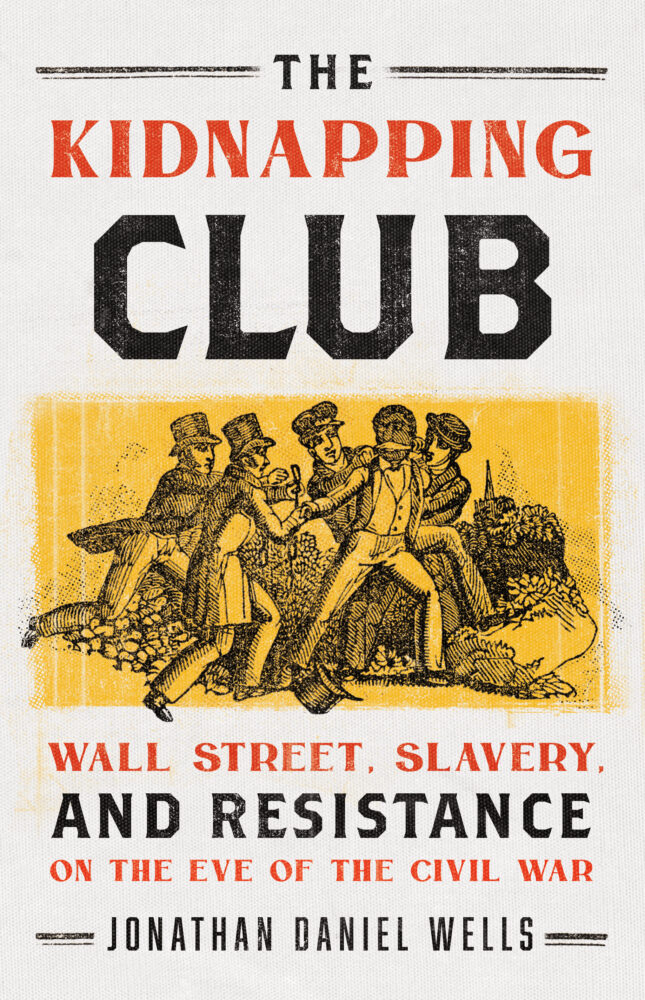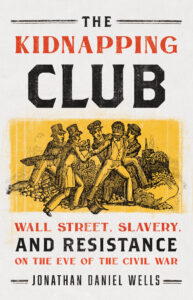Sent South into Bondage
A historian chronicles kidnapping in antebellum America
Published: March 1, 2021
Last Updated: June 8, 2021

Bold Type Books
Before slavery was abolished in America, Black citizens in free states were abducted and sent south into lives of bondage. These kidnappings, often sanctioned by the courts and carried out by the police, were commonplace. Antebellum capitalism, ever dependent upon cotton fields and forced labor, saw that it was so.
While runaway slaves in the North lived under the threat of being captured, so too did freeborn Black people. The story of Solomon Northup, made famous by the memoir and film Twelve Years a Slave, is the most well-known portrayal of this sort of brazen kidnapping. A freeborn Black man from New York, Northup was abducted after traveling to Washington, DC, and sold into slavery. He lived in bondage for twelve years in Louisiana before regaining his freedom to tell his distressing tale.
Throughout the early nineteenth century, an untold number of Black men, women, and children were victimized on account of the Fugitive Slave Clause, an edict within the Constitution that allowed for the recapture of runaways. In The Kidnapping Club: Wall Street, Slavery, and Resistance on the Eve of the Civil War (Bold Type Books, 2020), Jonathan Daniel Wells expands on this indefensible past. A historian of nineteenth-century America, the author makes a strong case for placing southern slavery within a national context. For Louisiana, where vestiges of the antebellum era are easily found in place names and plantation estates, Wells’s book serves as a reminder that the country’s foundational legacy of racial capitalism extends well north of the Mason-Dixon Line.
To illustrate how slaveholders in states like Louisiana were financed, Wells directs our attention to pre-Civil War New York, the North’s “most potent proslavery and pro-South city.” A budding nerve center of global commerce, New York was full of bankers and insurance companies whose fortunes were built by underwriting the cotton trade. Wall Street protected slavery, as without slavery there would be no Wall Street. The human cost of so much wealth was overshadowed by the lure of profit. And so when a Black person residing in Manhattan was arrested on the presumption that they were a runaway slave, this was merely seen as the price of doing business, regardless of whether or not the accused was ever a slave or if the institution of slavery was morally sound. “It sometimes seemed the entire city, knowing that its richness and supremacy depended on southern slavery, was more interested in reassuring slaveholders than in protecting the basic human rights of its Black residents,” writes Wells.
Much of The Kidnapping Club centers around David Ruggles, an African American activist living in New York. Along with demanding abolition, Ruggles was an avid proponent of biracial democracy. He fought for Black civil rights and rejected the tenets of the American Colonization Society, a group of moderate and conservative politicians who proposed sending free Black people back to Africa in place of emancipation. He criticized white northerners who showed little regard for the plight of the enslaved. He also named and fought back against the police, politicians, lawyers, judges, and slave traders who oppressed the city’s Black residents.
At the time of the New York Kidnapping Club’s formation in the early 1830s, roughly three million people were enslaved throughout the South. A slave could cost upwards of $1,500, equal to around $40,000 today. When an enslaved person fled bondage, slaveholders demanded their return, thinking of runaways not as people but as property. The Kidnapping Club readily obliged, ensuring continued goodwill between Wall Street brokers and southern plantations, not to mention financial gains for all parties involved.
At the start of the following decade, a change in state laws temporarily curbed the exploits of the Kidnapping Club. Trial by jury emerged as a legal requirement in all cases of alleged runaways, protecting Black citizens from impromptu kidnappings. Additionally, illegal kidnappings became a punishable offense carrying a maximum sentence of ten years.
But in 1850, the United States Congress passed the Fugitive Slave Act, renewing the possibility of arresting and abducting Black people living in free states. Emboldened by what Wells refers to as “one of the most detestable laws ever enacted by Congress,” slaveholders again demanded the return of runaways. Once more, northern police worked on behalf of southern slavery. Regarding this particular period, Wells draws an interesting connection to the current controversy over sanctuary cities, as the Fugitive Slave Act required that citizens “turn away runaways seeking aid and comfort and instead actively help in their return.” In Wells’s estimation, “the law generated a potent wave of outrage that set the nation on the path to civil war.”
As The Kidnapping Club makes clear, anti-Blackness was not limited solely to southern states. In truth, the approbation of human bondage was written into America’s founding document. Slavery was a national institution, the defense of which perpetuated discrimination of people of color throughout the country. As Wells describes, “Even those who counted themselves as liberal on matters like slavery and race harbored deep-seated beliefs about the inferiority of African Americans.”
In depicting the close links between slavery and capitalism, Wells presents a challenging history and a difficult question: How can a nation reconcile with its origins? In his book’s final chapter, the author—along with making a case for the study of history, as well as noting similarities between nineteenth-century abolitionists and the Black Lives Matter movement—provides an argument in favor of reparations. Albeit brief, that it’s the endnote speaks to the overall character of the text and the intent of its author. America owes a long-overdue debt. If paid, Louisiana stands to become a better place. But to begin the process of restitution, it’s necessary to assess the damage.
Andru Okun is a freelance writer living in New Orleans.
